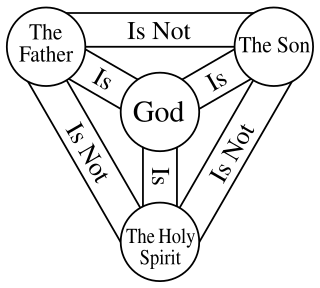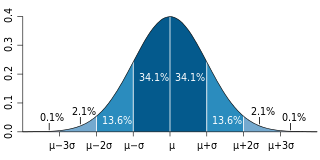
Allah is an Arabic word for God, particularly the God of Abraham. Outside of the Middle East, it is principally associated with Islam, although the term was used in pre-Islamic Arabia and continues to be used today by Arabic-speaking adherents of any of the Abrahamic religions, including Judaism and Christianity. It is thought to be derived by contraction from al-ilāh and is linguistically related to God's names in other Semitic languages, such as Aramaic and Hebrew.
Agnosticism is the view or belief that the existence of God, the divine, or the supernatural is either unknowable in principle or unknown in fact. It can also mean an apathy towards such religious belief and refer to personal limitations rather than a worldview. Another definition is the view that "human reason is incapable of providing sufficient rational grounds to justify either the belief that God exists or the belief that God does not exist."
Arianism is a Christological doctrine which rejects the traditional notion of the Trinity and considers Jesus to be a creation of God, and therefore distinct from God. It is named after its major proponent, Arius. It is considered heretical by most modern mainstream branches of Christianity. It is held by a minority of modern denominations, although some of these denominations hold related doctrines such as Socinianism, and some shy away from use of the term Arian due to the term's historically negative connotations. Modern mainstream denominations sometimes connected to the teaching include Jehovah's Witnesses, some individual churches within the Churches of Christ, as well as some Hebrew Roots Christians and Messianic Jews.

Abraham is the common Hebrew patriarch of the Abrahamic religions, including Judaism, Christianity, and Islam. In Judaism, he is the founding father of the special relationship between the Jews and God; in Christianity, he is the spiritual progenitor of all believers, whether Jewish or non-Jewish; and in Islam, he is a link in the chain of Islamic prophets that begins with Adam and culminates in Muhammad. As the namesake of the Abrahamic religions, Abraham is also revered in other Abrahamic religions, such as the Druze faith and the Baháʼí Faith.

Reformed Christianity, also called Calvinism, is a major branch of Protestantism that began during the 16th-century Protestant Reformation. In the modern day, it is largely represented by the Continental Reformed, Presbyterian, and Congregational traditions, as well as parts of the Anglican and Baptist traditions.
Love encompasses a range of strong and positive emotional and mental states, from the most sublime virtue or good habit, or the deepest interpersonal affection, to the simplest pleasure. An example of this range of meanings is that the love of a mother differs from the love of a spouse, which differs from the love of food. Most commonly, love refers to a feeling of strong attraction and emotional attachment.
Monotheism is the belief that one God is the only, or at least the dominant deity. A distinction may be made between exclusive monotheism, in which the one God is a singular existence, and both inclusive and pluriform monotheism, in which multiple gods or godly forms are recognized, but each are postulated as extensions of the same God.

Mormonism is the theology and religious tradition of the Latter Day Saint movement of Restorationist Christianity started by Joseph Smith in Western New York in the 1820s and 1830s. As a label, Mormonism has been applied to various aspects of the Latter Day Saint movement, although since 2018 there has been a push from The Church of Jesus Christ of Latter-day Saints to distance itself from this label. One historian, Sydney E. Ahlstrom, wrote in 1982 that, depending on the context, the term Mormonism could refer to "a sect, a mystery cult, a new religion, a church, a people, a nation, or an American subculture; indeed, at different times and places it is all of these."

Sunni Islam is the largest denomination of Islam, followed by 85–90% of the world's Muslims, and simultaneously the largest religious denomination in the world. The word Sunni refers to those who observe the Sunnah, referring to the traditions and practices of Muhammad. The differences between Sunni and Shia Muslims arose from a disagreement over the succession to Muhammad and subsequently acquired broader political significance, as well as theological and juridical dimensions. According to Sunni traditions, Muhammad left no successor and the participants of the Saqifah event elected Abu Bakr as the first caliph. This contrasts with the Shia view, which holds that Muhammad appointed his son-in-law and cousin Ali ibn Abi Talib as his successor.

The Trinity is the Christian doctrine concerning the nature of God, which defines one God existing in three, coeternal, consubstantial divine persons: God the Father, God the Son and God the Holy Spirit, three distinct persons (hypostases) sharing one essence/substance/nature (homoousion).

Determinism is the philosophical view that all events in the universe, including human decisions and actions, are causally inevitable. Deterministic theories throughout the history of philosophy have developed from diverse and sometimes overlapping motives and considerations. Like eternalism, determinism focuses on particular events rather than the future as a concept. Determinism is often contrasted with free will, although some philosophers claim that the two are compatible. A more extreme antonym of determinism is indeterminism, or the view that events are not deterministically caused but rather occur due to random chance.
The existence of God is a subject of debate in the philosophy of religion and theology. A wide variety of arguments for and against the existence of God can be categorized as logical, empirical, metaphysical, subjective, or scientific. In philosophical terms, the question of the existence of God involves the disciplines of epistemology and ontology and the theory of value.

Jesus, also referred to as Jesus Christ, Jesus of Nazareth, and many other names and titles, was a first-century Jewish preacher and religious leader. He is the central figure of Christianity, the world's largest religion. Most Christian denominations believe Jesus to be the incarnation of God the Son and the awaited messiah, or Christ, a descendant from the Davidic line that is prophesied in the Old Testament. Virtually all modern scholars of antiquity agree that Jesus existed historically. Accounts of Jesus's life are contained in the Gospels, especially the four canonical Gospels in the New Testament. Academic research has yielded various views on the historical reliability of the Gospels and how closely they reflect the historical Jesus.

Adam is the name given in Genesis 1–5 to the first human. Adam is the first human-being aware of God, and features as such in various belief systems.

In monotheistic belief systems, God is usually viewed as the supreme being, creator, and principal object of faith. In polytheistic belief systems, a god is "a spirit or being believed to have created, or for controlling some part of the universe or life, for which such a deity is often worshipped". Belief in the existence of at least one god is called theism.

In Christianity, God is the eternal, supreme being who created and preserves all things. Christians believe in a monotheistic conception of God, which is both transcendent and immanent. Christians believe in a singular God that exists in a Trinity, which consists of three Persons: God the Father, God the Son, and God the Holy Spirit. Christian teachings on the transcendence, immanence, and involvement of God in the world and his love for humanity exclude the belief that God is of the same substance as the created universe but accept that God the Son assumed hypostatically united human nature, thus becoming man in a unique event known as "the Incarnation".
Atheism, in the broadest sense, is an absence of belief in the existence of deities. Less broadly, atheism is a rejection of the belief that any deities exist. In an even narrower sense, atheism is specifically the position that there are no deities. Atheism is contrasted with theism, which is the belief that at least one deity exists.
God of War is an action-adventure game franchise created by David Jaffe and developed by Sony's Santa Monica Studio. It began in 2005 on the PlayStation 2 (PS2) video game console and has become a flagship series for PlayStation, consisting of nine installments across multiple platforms. Based on ancient mythologies, the series' plot follows Kratos, a Spartan warrior who becomes the God of War and comes into conflict with various mythological pantheons. The earlier games in the series are based on Greek mythology and see Kratos follow a path of vengeance against the Olympian gods; the later games are based on Norse mythology and see Kratos on a path of redemption while also introducing his son Atreus as a secondary protagonist, as they come into conflict or interact with various Norse deities and figures.

Thomas Aquinas was an Italian Dominican friar and priest, the foremost Scholastic thinker, as well as one of the most influential philosophers and theologians in the Western tradition. He was from the county of Aquino in the Kingdom of Sicily.












